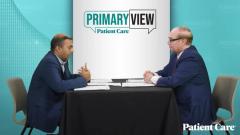
Identifying and Managing CKD With Other Comorbid Conditions
Experts highlight considerations for patients with chronic kidney disease and other comorbid conditions, particularly diabetes, in terms of screening and preventative care.
Episodes in this series

Transcript
Dhiren Patel, PharmD: Do you see more [frequently that] both tests are being ordered or done in [patients with] comorbid conditions?
Robert Busch, MD: Diabetes and hypertension, [tests for both] should both be ordered, not only because it would give you an idea of who’s going to have their kidney disease worsen. It’s not the be-all and end-all, but it’s better than not ordering them. But we have drug therapy beyond RAS inhibitors that have been used for years to benefit the kidneys that could do something more, whether it is in diabetes or nondiabetes in SGLT2 or in diabetes, in an non–mineralocorticoid inhibitor such as fluorenone or maybe GLP1, which is being looked at. So we have a lot of drugs that could benefit the patient if we knew that was someone we’re very worried about versus someone we’re less worried about.
Dhiren Patel, PharmD: In this specific test, this KidneyIntelX test that you mentioned, it would be obvious in patients with diabetes; that’s an easy one. What about prediabetes?
Robert Busch, MD: The test has been looked at in patients with diabetes in a large database. The higher the score, the more likely those patients were to go on to end-stage kidney disease or worsen their GFR by 40%. So that’s where it’s been looked at. But personally, if they had prediabetes and hypertension and other reasons to have renal disease, I would still do something about it. Remember, there are drugs: RAS blockers and SGLT2s can be given in nondiabetes for renal benefit. Fluorenone doesn’t yet have that benefit, and we’ll see GLP [glucagonlike peptide-1] is indicated for obesity. We’ll see what happens when those trials come out….
Dhiren Patel, PharmD: Sure. So…[what is] the advice that you would give for early intervention and screening, whether it be diabetes, prediabetes? What are some things that you wish were happening? What preventative strategies have you talked to your colleagues about doing? Because sometimes by the time these patients come to you, it’s too late, and there are now tools and preventative strategies that we could have used to ward off some of these serious complications.
Robert Busch, MD: Well, certainly if a patient has prediabetes, I’d like to know it. So [I would] do an [test of their hemoglobin] A1C or do a fasting glucose. If it’s over 100, or for a 2-hour post prandial, 140 to 199, that would be important to see…. One of our gurus, Dr DeFranzo, always talks about diabetes as a spectrum. It’s not like you didn’t have diabetes when you had an A1C of 5.7 and then you do have it at 6.5. What about the gray zone? So those patients should be treated like they have diabetes and aggressively [treated] with lifestyle [changes] and maybe even some of the drug therapy that we use for diabetes.
Transcript was AI-generated and edited for clarity.
Newsletter
Enhance your clinical practice with the Patient Care newsletter, offering the latest evidence-based guidelines, diagnostic insights, and treatment strategies for primary care physicians.









































































































































